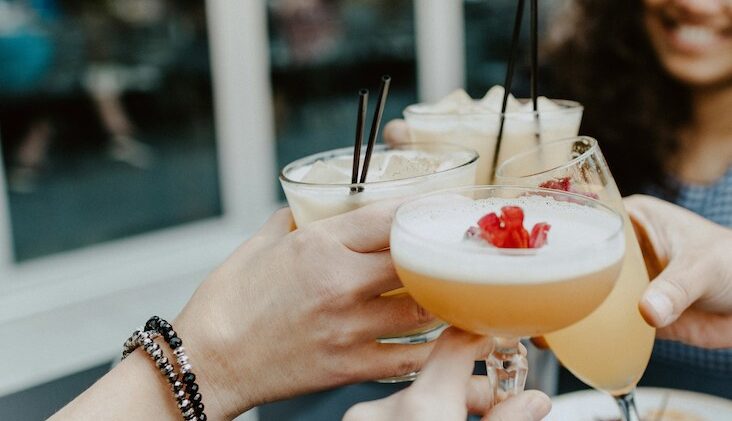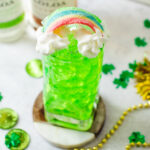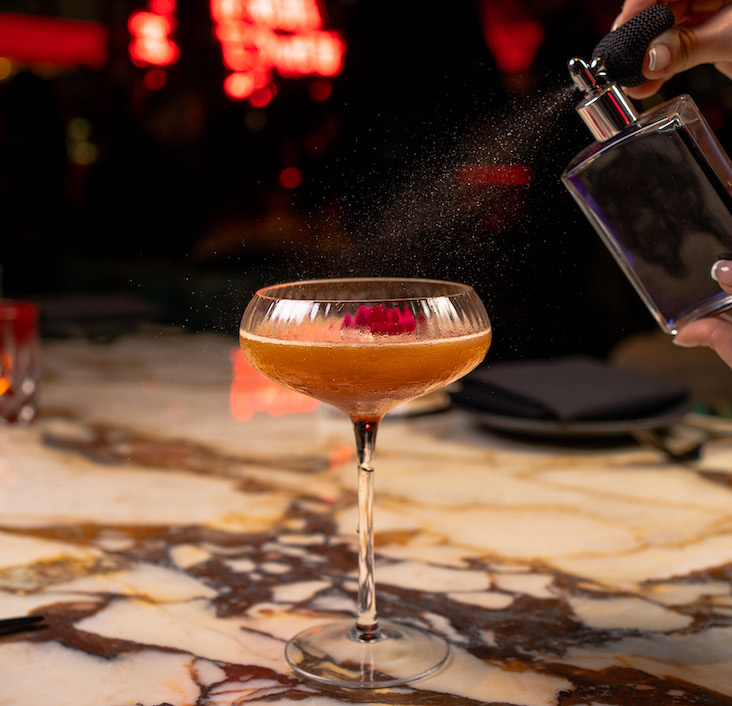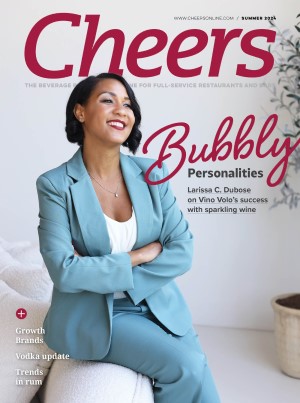Imagine walking into a boutique seaside hotel lounge in coastal Maine called the Ocean Breeze. What would you order? A bottle of the same wine or beer you drink every evening at home, or would you opt for The Salty Sailor, a cocktail that partners with a renowned distillery to deliver the flavors of locally sourced sea salt, tangy citrus vodka and a splash of ocean-inspired botanicals?
Of course, some will opt for the same old drink they’re used to. But chances are, if you’re traveling, you’ll want something that embodies the character, history and flavor of the place you’re visiting.
And you’re not alone. Recent trends show a surge in interest in inventive and high-quality drinks. From savory cocktails to specialty ice, there’s a clear shift towards drinks that aren’t just beverages, but experiences.
Thanks to this trend, hospitality establishments such as hotels, bars, restaurants and lounges partner more frequently with brands to offer not just custom cocktails, but entire immersive experiences. Especially when collaborating with top liquor brands, these businesses can craft signature cocktails that reflect their unique location and create a memory with each sip.
As we explore this fusion of mixology and marketing, we’ll uncover the art behind location-specific cocktails setting new standards in the beverage experience.
Signature cocktails: mixology meets storytelling
As a hospitality brand, you want to tell the story of both you and your location, and mixology provides a perfect opportunity. Custom cocktails are more than a drink; they incorporate everything from local ingredients, cultural influences and historical references into their presentation.
Here are some techniques you can use to capture that special essence that will keep guests coming back.
• Curate innovative names and themes. Invent unique signature drink names that convey a theme. For example, consider a cocktail called Coastal Twilight, made with lavender-infused gin, hints of blueberry, and a touch of sparkling elderflower.
What does that conjure up? Vibrant colors that paint the sky as the sun sets over the ocean. One taste, and you’re there. Then, elevate the aesthetic of your menus and establishment ambiance to match.
• Collaborate with experts in mixology. Work with skilled mixologists who intimately understand the world of spirits to lessen the burden on your team. Ensure that their values, personality and work styles are of the topmost quality and accurately reflect and represent your brand.
• Maintain consistency in quality. With skilled mixologists and a highly trained staff, you must also ensure your product is executed perfectly every time to keep customers returning. Even when you rotate your menu or themes, be sure to maintain the same level of quality and notoriety that your brand is best known for.
• Incorporate interactive experiences. Host a tasting event or hands-on workshop in your space where customers can follow along to truly grasp the art of mixology and digest your brand story from start to finish. Additionally, ensure your mixologist hosts can concoct specialty drinks and balance the arts of storytelling and entertaining while multitasking.
How top partnerships can create signature cocktails
By integrating the concepts of storytelling with innovative mixology, we can see how top partnerships are revolutionizing the creation of signature cocktails. For example, take Ketel One’s recent introduction of their Espresso Martinis machine in various hotels, lounges and bars. The product simplifies and speeds up the process of making Espresso Martinis — an extremely popular yet complex cocktail.
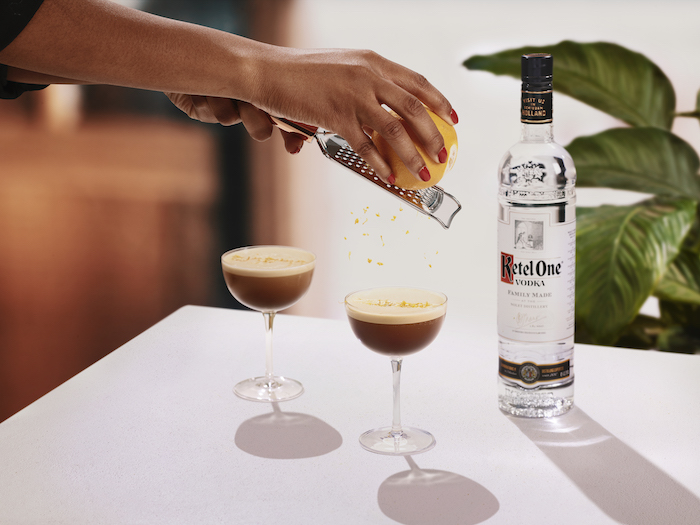
Ketel One invented its design to produce individual cocktails in just 20 seconds per drink. The technology works by mixing ingredients added by a bartender and infusing everything together with nitrogen to achieve the Espresso Martini’s characteristic appearance and texture. This significantly lessens the manual work for the mixologist so that they can focus on engaging with the consumer for a more immersive experience.
Hospitality establishments can leverage this type of technology and partnership to introduce bespoke cocktails that align with their unique narrative, plus engage and discuss stories such as the unique history of a spirit, the origins of the cocktail, the establishment’s backstory, the local or cultural ingredients and the like.
4 Steps to craft signature cocktails that keep guests coming back
In such a competitive industry, standing out is key. What better way to do so than by offering a signature cocktail that speaks volumes about your brand? Here are four essential steps to create a signature drink that tastes great and tells a compelling story.
1. Conduct preliminary market research.
Make sure your brand not only deeply understands beverage trends and popular ingredients on the market — or partners with someone who does — but also has a good grasp of your target consumer’s preferences. These preferences could include everything from their overall lifestyle choices to their alcohol consumption and purchasing behaviors.
Consider connecting with the community directly through field team tactics to have a boots-on-the-ground approach to learning and utilization. Then use these resources to identify gaps or opportunities in the market that your brand can fill.
2. Select a partner that fits your brand.
The best partnership is one that’s based on synergistic energy. Choose a partner whose background, ethos and values align with your own and whose brand image helps to complement and enhance it.
For example, sustainability is a growing trend in the beverage market, where 42% of the general population (along with 56% of Gen Z and 53% of Millennials) try to buy only from companies that are socially and environmentally responsible. If this resonates with your brand, find a partner with similar values and thread it through your signature cocktail’s name, ingredients, story and overall aesthetic.
Remember, while brand partnerships that are mainstream or expected tend to perform well, if you really want to grab attention, don’t shy away from working with your competition or a completely unexpected brand. Just remember to ensure that your target audience is aligned and that your businesses prioritize the same values, and it’s bound to be a good fit.
3. Curate the signature cocktail.
This step is where you can truly let your creativity shine. When selecting a partner, consider brands that offer more diversity, versatility and flexibility. Then, collaborate to ideate drinks that exude your partnership’s values and align with your target consumer’s preferences.
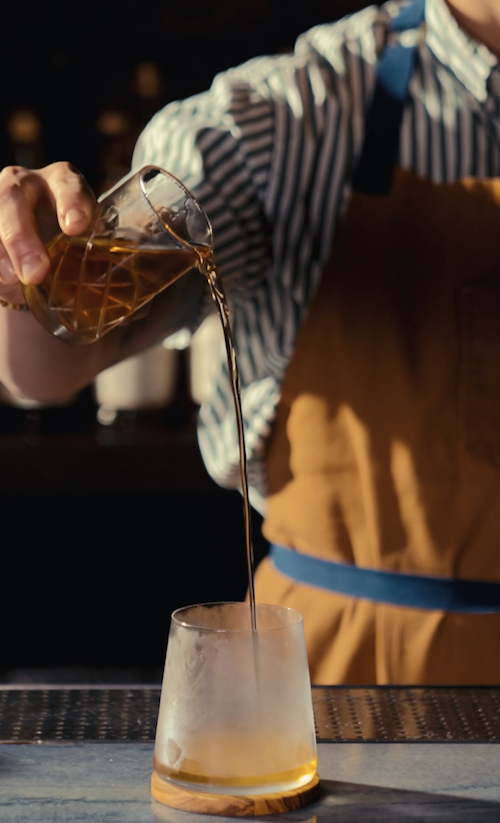
For example, if you’ve decided to focus on sustainability, you could entice guests with handpicked herbs from nearby organic gardens, added to a smooth gin infused with wild raspberries. Or, consider including a touch of honey sourced from local beekeepers that would add a touch of subtle sweetness to balance notes of fresh lemon juice. Whatever you choose, make sure it aligns with your brand’s overall story and helps guests enjoy a local experience unlike any other.
4. Learn how to market effectively.
Take your drinks to the masses by getting on social media and developing creative captions around the story of each signature drink. Focus on adding eye-catching photos and videos to build excitement and encourage Instagrammability.
If you want to enlist influencers, consider sending them signature cocktail kits or other promotional packages, and always welcome consumer feedback and integrate your learnings into your product. Continue to test and refine your drink as needed to keep the spirits flowing — responsibly, of course.
Crafting a signature drink takes a dash of brand identity, a splash of market research, a pinch of partnership, a fresh mix of creative ingredients and some clever marketing techniques. With these ingredients mixed, your brand can concoct the perfect signature drink that embodies your essence, enchants your audience and stirs up a heady dose of media buzz.
Kim Lawton is the founder and CEO of Enthuse Marketing Group, a woman-owned marketing agency based in New York.
Feature photo by Kelly Sikke on Upsplash.

